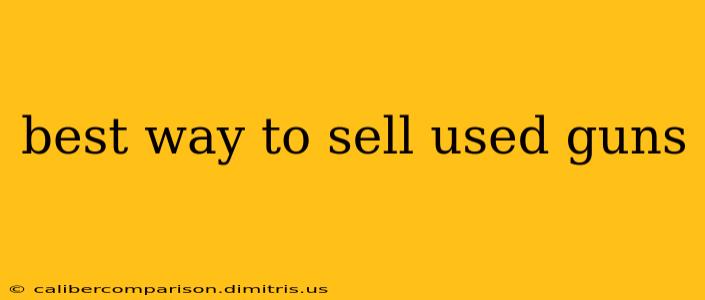Selling a used firearm requires careful consideration of legal requirements and safety protocols. This guide outlines the best practices for a safe and legal transaction, ensuring both your safety and the safety of the buyer. Remember, firearm laws vary significantly by location, so always prioritize compliance with your local, state, and federal regulations.
Understanding Your Local Laws: The Foundation of Safe Gun Sales
Before you even list your firearm, thoroughly research the legal requirements in your area. This includes:
- Licensing and registration: Some jurisdictions require licenses for firearm sales or mandate registration of firearms. Failure to comply can lead to serious legal consequences.
- Background checks: Many states require background checks for all firearm transfers, even private sales. Understanding the specific requirements and how to properly conduct a background check is crucial. This often involves utilizing a licensed firearms dealer as an intermediary.
- Prohibited transfers: Certain individuals are legally prohibited from owning firearms. Familiarize yourself with these restrictions to avoid inadvertently selling to a prohibited person.
- Record-keeping: Keep detailed records of the sale, including the buyer's information (as permitted by law), date of sale, and firearm description. This can be invaluable in case of future inquiries or investigations.
Choosing the Right Sales Platform: Maximizing Reach and Security
Several platforms offer options for selling used firearms, each with advantages and disadvantages:
- Licensed Firearms Dealers: This is often the safest and most legally compliant option. Dealers handle all the paperwork, background checks, and transfer procedures, ensuring compliance with all regulations. However, you'll likely receive a lower price due to their fees and profit margin.
- Online Gun Forums and Marketplaces: These platforms can reach a wider audience and potentially offer higher prices. However, they require extra diligence in verifying buyer legitimacy and conducting safe transactions. Thoroughly vet potential buyers and prioritize face-to-face transactions whenever possible.
- Local Gun Shows: These events offer a chance to meet buyers in person and potentially negotiate a better price. However, they can be less regulated than online marketplaces, requiring additional caution.
- Private Sales (with proper legal compliance): While offering potential for higher returns, private sales demand meticulous adherence to all local regulations regarding background checks and record-keeping.
Safe and Secure Transaction Practices: Protecting Yourself and Others
Regardless of the chosen platform, prioritize safety throughout the process:
- Meet in a public place: Always conduct the transaction in a well-lit, public location with witnesses present if possible. Never meet at your home or the buyer's home.
- Inspect the buyer's identification: Verify the buyer's identity using a government-issued photo ID and carefully compare it to the information provided.
- Thoroughly inspect the firearm before transfer: Confirm the firearm's condition and serial number match the documentation.
- Unloaded firearm: Always ensure the firearm is unloaded and the action is open before handling it during the transaction.
- Know your rights: Familiarize yourself with your legal rights regarding self-defense during the transaction.
Pricing Your Firearm Competitively: Balancing Value and Demand
Research comparable firearms to determine a fair market price. Consider the firearm's condition, make, model, accessories, and overall demand when setting your asking price. Be prepared to negotiate, but don't undervalue your firearm.
Preparing Your Firearm for Sale: Enhancing its Appeal
Properly cleaning and preparing your firearm can significantly improve its appeal to potential buyers:
- Thorough cleaning: Clean the firearm meticulously, removing all dirt, residue, and oil.
- Minor repairs (if necessary): Address any minor cosmetic issues to enhance its overall appearance.
- Accurate description: Provide a detailed and honest description of the firearm's condition, including any flaws or imperfections.
- High-quality photos: Use clear and well-lit photos to showcase the firearm's condition and features.
Selling a used firearm responsibly and legally requires diligence and preparation. Prioritize safety, compliance with local regulations, and careful vetting of potential buyers to ensure a smooth and secure transaction. Remember to always consult with legal counsel if you have any questions or uncertainties.

